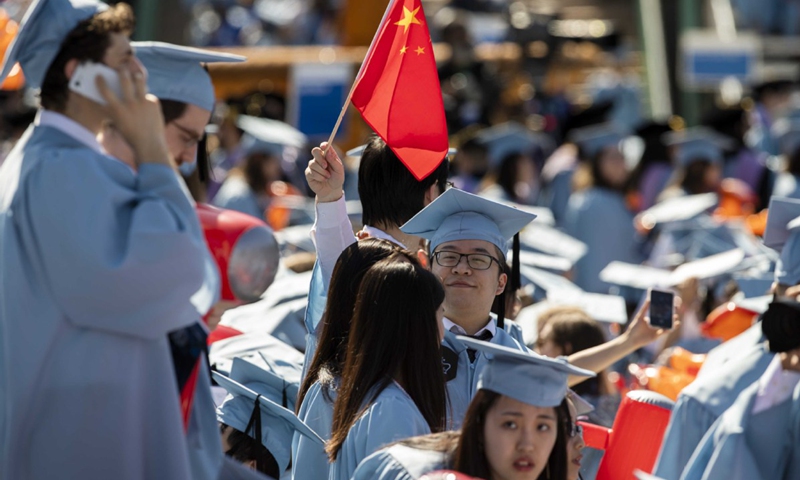
Graduate students from China attend the Columbia University Commencement ceremony in New York, the United States, May 22, 2019. Photo: Xinhua
Following the issuance of a travel risk alert for tourists traveling to the US and a study abroad alert concerning a US state by China on Wednesday, some Chinese tourists, overseas education institutions and students who are planning to study or are currently studying in the US expressed their concerns over safety.
Both alerts came after the Customs Tariff Commission of China's State Council announced Wednesday that China will raise additional tariffs for imported goods originating in the US to 84 percent from 34 percent from April 10. On April 8, the US further increased the "reciprocal tariffs" on Chinese products exported to the US to 84 percent from 34 percent.
China's Ministry of Culture and Tourism on Wednesday night released a notice urging Chinese tourists to fully assess the risks of traveling to the US, and to exercise caution when traveling to the country.
The alert was issued in light of the recent deterioration of China-US economic and trade relations, as well as the domestic security situation in the US, the ministry said, the Xinhua News Agency reported.
In response to a media inquiry regarding the risk alert, Chinese Foreign Ministry spokesperson Lin Jian stated on Thursday that the situation is caused by the US' hegemonic and bullying acts of exerting maximum pressure. These actions have weakened the social and public foundations of China-US relations and have hindered exchanges and cooperation between the two countries in multiple fields, Lin said, adding that China will continue to take strong measures to safeguard its own legitimate rights and interests.
After this risk alert was issued, many tourists that had planned to visit the US expressed anxiety and concerns on Chinese social media platforms.
A netizen surnamed Yang from East China's Anhui Province told the Global Times on Thursday that she had canceled all arrangements for her trip scheduled next Friday after seeing the risk alert. "The current tension has altered the travel atmosphere and heightened my safety concerns," Yang said.
Another netizen surnamed Li said that he immediately purchased refundable travel insurance upon seeing the authority's risk alert as a precaution.
"We're worried rising tensions might spill over to ordinary people, so we've decided to cut our trip short," an anonymous netizen who had just arrived in the US a week earlier for a planned month-long visit told the Global Times on Thursday.
A Shenzhen-based travel agency specializing in US travel routes for over 20 years told the Global Times on Thursday that they had received several customer inquiries within the last 24 hours.
"Most inquiries are about safety concerns, with some customers asking whether their trips might be affected," the agency said. They noted that they would inform all customers about the current situation and prioritize safety above all else.
On Wednesday, China's Ministry of Education also issued the first study abroad alert for 2025. The ministry reminds all students to make a good security risk assessment and enhance their awareness of precaution when choosing to study in the relevant states in the US in the near future.
The alert was issued after the US state of Ohio passed a higher education bill recently that includes negative provisions related to China and imposes restrictions on educational exchange and cooperation between Chinese and US higher education institutions, the ministry said, according to Xinhua.
Hannah Liang, an education consultant who works for a Beijing-based agency, told the Global Times that some of her clients have expressed concerns over the instability of the US' immigration policies and cut of institute funding for months, and the latest news has further aggravated their concerns.
"Unlike the traditional application strategy of focusing mostly on one country, many students have also applied or are preparing to apply for schools in the UK and Australia fearing uncertainty in the US," Liang said.
Liang maintains contact with some of her past clients who are currently in the US. "None of them has had their student status canceled, but panic is spreading."
Sun Fan, a Computer Science postgraduate student at Purdue University, said that the issuance of the alert made his friends and him feel the tightening of educational exchanges even more than before, worrying that it might affect their student visas and graduation.
"I truly hope that educational exchanges between the two countries can become more stable and supportive," Sun said, noting that "We came here to learn and grow. All we ask for is a welcoming environment where we can focus on our education without fear or uncertainty."
On March 19, the Chairman of the US House "Select Committee on the CCP" John Moolenaar sent letters to presidents of six US universities, claiming that China has embedded researchers in leading US institutions, providing them direct exposure to sensitive technologies with dual-use military applications. In response, Chinese Foreign Ministry spokesperson Mao Ning said on March 20 that China urges the US to stop brandishing national security as a false pretext and protect the legitimate and lawful rights and interests of Chinese students in the US. The US should not take discriminatory and restrictive measures against Chinese students.





